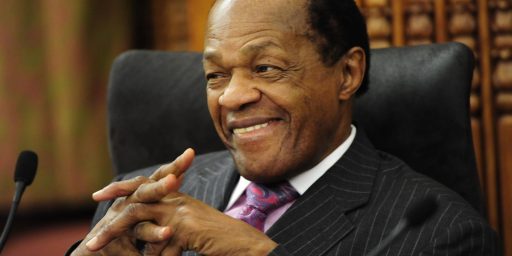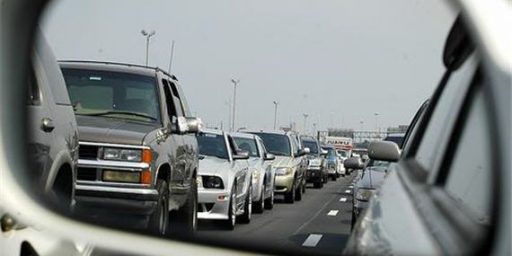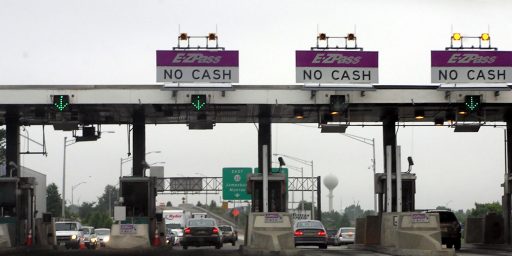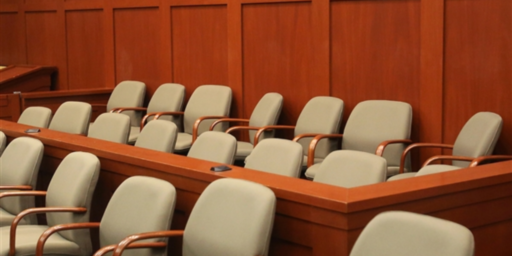D.C. Commuter Tolls
After years of having Congress knock down attempts at imposing a commuter tax, three D.C. Council members have proposed a workaround, Harry Jaffee reports.
Three council members — Kwame Brown, Harry Thomas Jr. and Marion Barry — have introduced legislation to study the idea of creating a toll system to charge commuters who want to cross the D.C. line.
[…]
Says Ward 2 Council Member Jack Evans, chairman of the Finance and Revenue Committee: “I’m looking at the possibility of holding a hearing on the bill. I would expand it to see how we could capture more revenue from commuters. The District of Columbia continues to subsidize two of the richest counties in America.”
That would be Fairfax County, Virginia, and Montgomery County, Maryland. By Evans’ accounting, commuters avail themselves of city services but pay no taxes to keep up the streets and bridges, let alone pay for cops and firefighters.
This reasoning — a slippery slope toward a commuter tax — is a surefire political winner in D.C. “Stick it to the suburbs” will translate directly into votes for Marion Barry and Harry Thomas. Both represent working-class wards on the city’s east and south sides. Kwame Brown, who serves at-large, can harvest votes citywide.
[…]
Every D.C. politician — from Evans to Gandhi and even to Barry — knows the end game of any proposal that attempts to tax commuters. Enacting such a tax would require a change in the Home Rule Charter and face a certain death in Congress.
Like it or not, paying a premium to use certain roads is coming. Once tolls get established for fast lanes on the Capital Beltway, the idea of paying a toll to enter the city might be right around the corner.
Commuter taxes have become quite popular in recent years, since they confiscate money from people who have no say in the matter. It’s taxation without representation and quite repugnant. The District would have done it long ago if they had the authority but Congress has rightly vetoed the move.
I’m not a fan of High Occupancy Toll lanes or carpool lanes, period, since they reserve roads that are being paid for by all the taxpayers for a select few. It’s also incredibly inefficient, since those lanes tend to be underutilized.
Still, that beats a tax on entering the nation’s capital.






The punch line about the DC Council attempting “No taxation without representation” is that they’ve been complaining about this same principle (with themselves on the receiving end, rather than the taking end) for years with regards to DC statehood. It’s even on the license plates: http://tinyurl.com/3a63br
True enough. I’m sympathetic to their desire for representation in Congress, too, although not their desire for statehood or quasi-statehood.
The federal employees union would never let this happen. Too many federal workers have cheap parking spaces they are not going to want to spend money driving to.
Mark: Most federal employees have no such ‘free parking’ spaces, in Washington or elsewhere. Only the top echelon of agencies or departments–and perhaps a few who, for safety reasons require it–get free parking. Even those, parking within federal buildings, do not get free parking: local prevailing rates are required to be charged.
If you’re below the top tiers, you’re on your own in the commercial parking world.
Instead of a commuter tax or toll gates, the DC government could institute an employment tax on employers. Since all employers gain benefit of DC infrastructure, they could all be taxed, morally and legally, with paying their share of the freight.
There’s actually a very good reason to prefer a toll over a tax on employers. The employer tax equally burdens all employees, regardless of the manner in which they choose to arrive at work. The same $10 will come out of the paychecks of those who walk half a block and those who park their cars inside the city. That wouldn’t be a good policy since the cost comes from the driving and parking, not the walking.
I’ve certainly never heard a toll described as “confiscation from people who have no say in the matter.” All of the tollpayers could choose to not drive across the boundary.
I’ve certainly never heard a toll described as “confiscation from people who have no say in the matter.”
I was talking about standard “commuter taxes,” which are income taxes paid by non-residents.
But paying a toll for a road that’s already been built by the federal taxpayer in order to visit the nation’s capital–which only exists as a city of significance because of the federal taxpayer–is outrageous.
It would certainly make me even less likely than now to venture into that horribly run city, too. It’s already nigh unto impossible to drive and park there; I’d sure be reluctant to pay a toll, too!
Unlike James, I’m not particularly sympathetic to DC’s plight. They benefit immensely from the presence of the federal government. I’m also a big fan of toll roads and don’t have a problem with people being charged with the use of roads, provided that it’s revenue neutral.